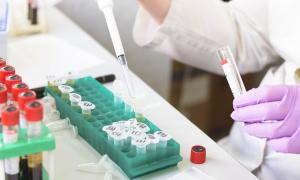Fundación Mutua funds a Can Ruti project on the role of unknown viruses in head and neck tumours

The ERICA Project, led by Germans Trias i Pujol Research Institute (IGTP), Institut Català d'Oncologia (ICO), and IrsiCaixa, is one of 23 new research projects that Fundación Mutua Madrileña will support this year across Spain
Fundación Mutua Madrileña has awarded its XXII Ayudas a la Investigación Médica (Medical Research Grants), worth €2.3 million, to 23 studies and clinical trials aimed at improving medical treatments. These projects will be carried out at various research centres throughout Spain. Among them are three projects based in Catalonia, which will receive nearly €300,000 in funding.
Exploring the viral origin of head and neck tumours
From IGTP, ICO and IrsiCaixa, the teams of Dr Beatriz Cirauqui and Dr Ester Ballana will launch the ERICA Project, which aims to investigate the role of viral infections in the development of squamous cell carcinoma of the head and neck, especially in patients who do not present with traditional risk factors such as tobacco or alcohol consumption, or the presence of human papillomavirus.
To do this, tumour samples will be analysed using next-generation sequencing technologies and artificial intelligence (AI) tools. The study aims to identify viruses not previously linked to this type of cancer and to better understand how they influence the onset and progression of the disease, as well as the immune response of the patient. "The ERICA Project arises from the collaboration of a multidisciplinary team of clinical professionals, basic translational researchers and bioinformatics experts. Together, we combine our knowledge to try to answer unresolved questions in patients with head and neck tumours, whom we treat daily in our clinics. In fact, the project is named in honour of one of these patients", explains Dr Cirauqui, researcher of the B·ARGO group at IGTP-ICO.
Dr Cirauqui believes that this project "will improve early diagnosis, provide a more accurate prognosis, and help design more personalised and effective treatments". This is especially important for patients whose cancer has no known cause and who currently face an uncertain outlook. "Identifying the mechanisms behind these types of cancer would help develop targeted therapies that improve prognosis, reduce side effects and enhance quality of life, and even contribute to the prevention of these tumours", concludes Dr Ester Ballana, principal investigator of the ViHIT group at IrsiCaixa.
Transplants and trauma, other areas funded in Catalonia
At the Bellvitge Biomedical Research Institute (IDIBELL), the team led by Dr Josep Maria Cruzado will launch a project in the field of kidney transplantation aimed at identifying new mechanisms to reduce the immune response against the new organ. This will be done through a novel approach focused on understanding the epigenetic characteristics of immune cells and how to modulate them.
"The possibility of inducing greater 'tolerance' of the kidney transplant would reduce the risk of organ rejection as well as the need for immunosuppressive therapies. This could prolong graft survival and reduce the side effects associated with chronic immunosuppression, ultimately improving the quality of life of our patients", explains Dr Carlos Couceiro, who will be part of this research led by Dr Cruzado.
The third Catalan study will be carried out at the Vall d'Hebron Research Institute, in the field of trauma. Dr Daniel Pachá will conduct a study to assess the safety and effectiveness of using decellularised nerve allografts for the repair of peripheral nerve injuries up to 50 mm in length. This involves using donor nerves from which all cells have been removed to avoid rejection and eliminate the need for immunosuppression in the recipient.
Peripheral nerve injuries are one of the most common causes of permanent disability in adults. More than 100,000 peripheral nerve surgeries are performed each year in Europe and the United States. Many of these injuries occur in the workplace and involve the upper limbs. They can result in significant dysfunction, such as loss of motor, sensory, and autonomic control in the affected areas, and also have a considerable socioeconomic impact.
Over 20 years of support for medical research
Through these grants, Fundación Mutua Madrileña has already allocated over €72.5 million to high-quality medical research in Spain.
This year's 23 new projects will focus on areas such as transplants, rare childhood diseases, severe traumatic injuries, oncology, and child and adolescent mental health. In this edition, the foundation will support the work of research teams from 18 centres across 9 autonomous communities.
The projects have been selected by the foundation's scientific committee, chaired by Dr Rafael Matesanz, and composed of Drs Ana Lluch, Enriqueta Ochoa, Miguel Caínzos, Antonio Torres, and Fernando Marco.
The award ceremony took place in Madrid and featured speeches from Ignacio Garralda, chairman of Grupo Mutua and Fundación Mutua Madrileña; Dr Rafael Matesanz, chair of the Scientific Committee; and Professor José Manuel Ribera Casado, full academic of Geriatrics and Gerontology at the Royal National Academy of Medicine (RANME) and emeritus professor of Geriatrics at the Complutense University of Madrid.